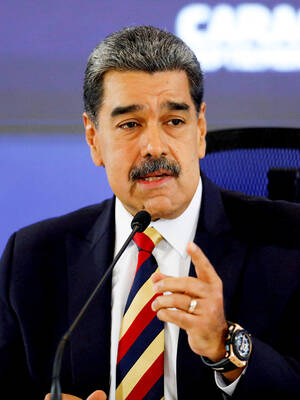China is celebrating the 15th century voyages of a Chinese eunuch admiral sailing as far west as the coast of Africa as evidence of its historical pursuit of peaceful relations with other countries and cultures.
Analysts say Zheng He's (
Festivities launched this week for the 600th anniversary of Zheng's voyages vaunt Beijing's benevolent diplomacy, remembering how the Muslim admiral led seven armadas through southeast Asia and beyond to spread Chinese influence from 1405 to 1433.
"Instead of occupying a single piece of land, building a fort or seizing treasure, Zheng He treated other countries with friendship," said Xu Zuyuan (徐祖遠), China's deputy minister of communications. "We think the legacy of Zheng He's seven voyages to the West is that a `peaceful rise' is the inevitable outcome of China's history."
Some China historians and maritime security experts take issue with Xu's assertion that Zheng's voyages bolstering the influence of the recently installed Ming dynasty were of a purely peaceful nature -- and not expansionist.
And a question mark hangs over the motives of Beijing's communist rulers as they slowly develop their coastal navy into a blue-water force capable of following in Zheng's wake and building relationships in southeast Asia.
"The current enhancement of the Chinese presence in the region is very much parallel to 600 years ago when Zheng He cruised through the region and tried to set foot in neighboring territory to extend Chinese influence," military expert Andrew Yang (楊念祖) said.
"The purpose is more or less identical -- to try to establish some kind of collaboration and cooperation conducive to China's long-term economic and national interests," said Yang, who is secretary-general of the Chinese Council of Advanced Policy Studies.
The goals of the 15th century admiral and his successors today have common features.
"They were military missions with strategic aims," writes scholar Geoff Wade of the National University of Singapore. "The military aspect of these voyages needs underlining, in part because of the stress placed on these missions in much current scholarship as `voyages of friendship.'"
Zheng wanted to not only spread imperial Ming influence but to develop trade. China's communist overlords want to have a say in regional diplomacy and also protect sea lanes that carry the oil to fuel their economy and their burgeoning exports.
"China's energy flows are very, very critical and will become more so in the years to come," said Prakash Metaparti, a former Indian navy commander and a naval expert at the Center for Asian Studies at the University of Hong Kong.
Several southeast Asian neighbors, and likely the US as well, worry about spreading Chinese influence and whether Chinese naval vessels will one day acquire the capability to sail into waters where Zheng's 62 warships and thousands of sailors conquered ports and gathered tribute.
Beijing may, for now, be more worried about ensuring an uninterrupted flow of oil imports through the Malacca Strait from the Middle East. It needs to guarantee that the industrial machine that has become the world's workshop provides a steady stream of jobs, boosts incomes and keeps the Communist Party in power.
"This is a long-term development strategy: to secure energy supplies in the surrounding sea area," Yang said. "Securing their maritime interests is vital for their economic and future survival."
Almost all of China's energy imports flow through the Malacca Strait, a narrow sea lane vulnerable to pirate attack. Terrorists have yet to strike there but security experts fear they may.
Oil accounts for 22 percent of China's total energy mix and a third comes from imports. The world's second-largest oil consumer will see oil accounting for 31 percent of its energy mix by 2020.
To protect those imports and expand the range of its influence, China takes a two-pronged strategy by spending on naval modernization and signing trade deals with neighbors.
But by 2020, it may only just be able to command a world-class navy. While Chinese submarines can now ply up to 500 nautical miles off shore, above the waves its ships still sail in a range little beyond 300 to 500 nautical miles from the coast.
"They will not be able to project their power anywhere beyond their immediate coast areas for at least 10 years, and maybe not for 15 to 20 years," Metaparti said.

‘NEO-NAZIS’: A minister described the rally as ‘spreading hate’ and ‘dividing our communities,’ adding that it had been organized and promoted by far-right groups Thousands of Australians joined anti-immigration rallies across the country yesterday that the center-left government condemned, saying they sought to spread hate and were linked to neo-Nazis. “March for Australia” rallies against immigration were held in Sydney, and other state capitals and regional centers, according to the group’s Web site. “Mass migration has torn at the bonds that held our communities together,” the Web site said. The group posted on X on Saturday that the rallies aimed to do “what the mainstream politicians never have the courage to do: demand an end to mass immigration.” The group also said it was concerned about culture,

CRACKDOWN: The Indonesian president vowed to clamp down on ‘treason and terrorism,’ while acceding to some protest demands to revoke lawmaker benefits Protests in Indonesia over rising living costs and inequality intensified overnight, prompting Indonesian President Prabowo Subianto to cancel a planned trip to China, while demonstrators reportedly targeted the homes of the finance minister and several lawmakers. Rioters entered Indonesian Minister of Finance Sri Mulyani Indrawati’s residence near Jakarta early yesterday, but were repelled by armed forces personnel, Kompas reported. Items were taken from the homes of lawmaker Ahmad Sahroni and two others, according to Detik.com. The reports of looting could not be independently verified, and the finance ministry has not responded to requests for comment. The protests were sparked by outrage over

VENEZUELAN ACTION: Marco Rubio said that previous US interdiction efforts have not stemmed the flow of illicit drugs into the US and that ‘blowing them up’ would US President Donald Trump on Wednesday justified a lethal military strike that his administration said was carried out a day earlier against a Venezuelan gang as a necessary effort by the US to send a message to Latin American cartels. Asked why the military did not instead interdict the vessel and capture those on board, Trump said that the operation would cause drug smugglers to think twice about trying to move drugs into the US. “There was massive amounts of drugs coming into our country to kill a lot of people and everybody fully understands that,” Trump said while hosting Polish President

A French couple kept Louise, a playful black panther, in an apartment in northern France, triggering panic when she was spotted roaming nearby rooftops. The pair were were handed suspended jail sentences on Thursday for illegally keeping a wild animal, despite protesting that they saw Louise as their baby. The ruling follows a September 2019 incident when the months-old feline was seen roaming a rooftop in Armentieres after slipping out of the couple’s window. Authorities captured the panther by sedating her with anesthetic darts after she entered a home. No injuries were reported during the animal’s time on the loose. The court in the